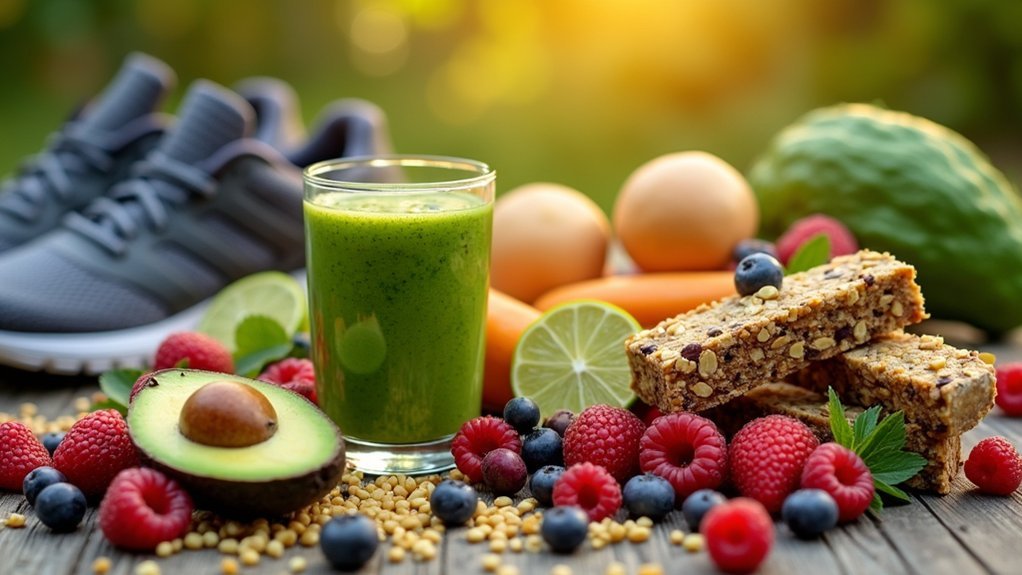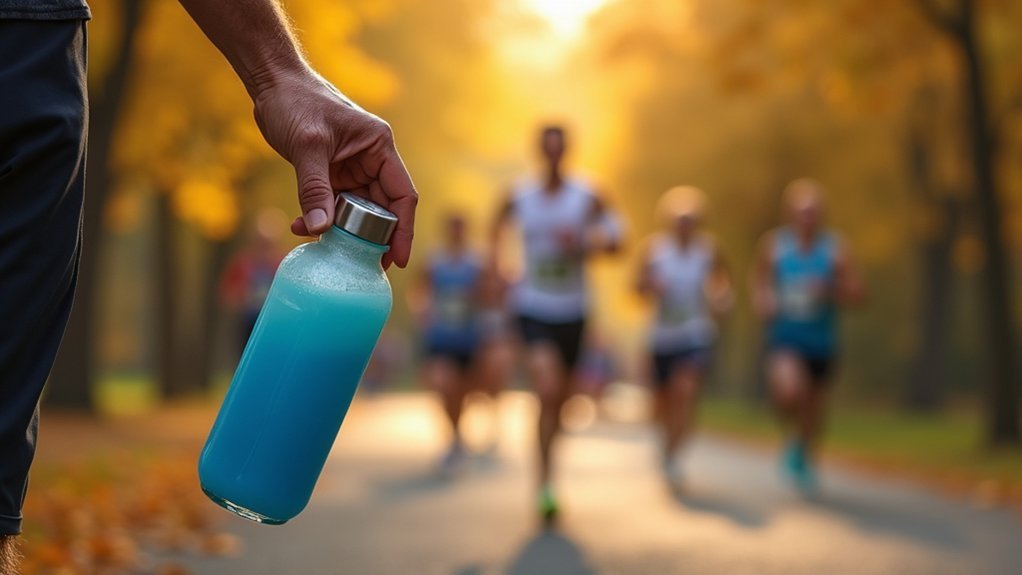Marathon fueling after 50 requires strategic adjustments to support your changing body. Focus on a 56% carbohydrate, 17% protein, and 27% fat distribution, with 7-10g of carbs per kg of bodyweight daily. Pay closer attention to hydration and electrolytes as kidney function declines, and prioritize recovery nutrition with a 4:1 carb-to-protein ratio within 30 minutes post-run. Smart supplementation with B vitamins, collagen, magnesium, and omega-3s can address age-specific needs that fuel your endurance journey.
Nutritional Foundations for the 50+ Marathon Runner

Three pillars form the nutritional foundation for marathon runners over 50: smart carbohydrate management, balanced macronutrient intake, and age-appropriate adjustments.
Your body requires approximately 7-10 grams of carbohydrates per kilogram of bodyweight daily, comprising about 55% of your total caloric intake to maintain glycogen stores. Consuming simple-to-digest carbs like bananas, bagels, or toast before runs will help optimize your performance without digestive discomfort.
Fuel strategically with 7-10g carbs per kg daily—essential for maintaining glycogen reserves during marathon training.
The ideal macronutrient distribution for you includes 56% carbohydrates, 17% protein, and 27% fat. This balance supports both energy needs and recovery processes. Protein becomes especially critical for muscle maintenance as you age.
As your body changes, you’ll need to adjust your nutrition strategy. Hormonal shifts affect metabolism, while digestive efficiency may decrease.
Focus on easily digestible foods and guarantee adequate calcium, vitamin D, iron, and B12 intake to prevent injuries and maintain bone health.
Hydration Strategies That Evolve With Age
Your body’s hydration needs change dramatically after 50, requiring a more strategic approach to electrolyte intake and fluid timing during marathons.
You’ll need to balance sodium levels more carefully as your kidneys become less efficient at maintaining electrolyte equilibrium with age.
Your recovery phase also demands special attention to rehydration, as your body’s diminished thirst response may mask your true fluid requirements post-race.
To prevent performance decline, consider monitoring your fluid intake closely, as even a 1% body water loss can significantly reduce your marathon performance capacity.
Electrolyte Balance Changes
As your body crosses the threshold of fifty years, the way it manages fluids and electrolytes undergoes significant changes that directly impact your marathon performance.
Your kidneys’ diminished capacity to regulate sodium, potassium, and calcium increases your vulnerability to exercise-associated hyponatremia during long runs.
You’ll likely experience decreased thirst sensation despite needing proper hydration. Your sweat composition changes too—you’re losing electrolytes differently than your younger counterparts. This means you need a more strategic approach to replacement. Research has shown runners who develop acute kidney injury typically lose twice as much sweat as those who don’t.
Don’t follow the same hydration rules you used in your thirties. Instead, monitor your body weight changes carefully, adjust sodium intake to compensate for altered kidney function, and resist overhydrating.
Consider personalized electrolyte supplements that account for your age-specific needs, especially during race conditions.
Timing Matters More
The strategic timing of hydration becomes increasingly significant as your body ages beyond fifty. While the classic advice of drinking every 10-15 minutes still applies, you’ll need more deliberate scheduling as your thirst sensors become less reliable.
Consider switching to smaller, more frequent sips rather than larger gulps. Your aging digestive system processes fluids more slowly, and frequent hydration prevents the stomach discomfort that can derail your marathon. Regular monitoring of your urine color throughout your training can provide valuable feedback about your hydration status.
Don’t wait until you’re thirsty—set reminders if necessary. Pre-race hydration deserves special attention too; begin hydrating properly the day before with electrolyte-enhanced fluids to promote retention.
Adjust your timing based on weather conditions—increase frequency in heat and humidity, even when running in cold temperatures when thirst cues diminish but fluid needs remain.
Recovery Fluid Needs
Recovering adequately after a marathon requires special attention to hydration when you’re over 50, since your body’s ability to process and retain fluids changes considerably.
Your kidney function naturally declines, affecting how efficiently you rehydrate post-race.
Weigh yourself before and after running to calculate exact fluid losses, then replace this volume within two hours.
Don’t rely solely on your thirst mechanism—it becomes less sensitive with age. Instead, develop a structured rehydration plan using both water and electrolyte-rich beverages.
Include sodium with your recovery fluids to help your body retain water effectively. Recent marathons like London 2024 have shown that older competitors need specialized hydration support to complete their races safely.
Incorporating hydration-rich foods like watermelon, cucumber, and tomatoes supports your rehydration efforts.
Remember that proper post-marathon fluid replacement isn’t just about comfort—it’s essential for your continued performance and health.
Recovery Nutrition: The Secret Weapon for Masters Athletes
Many marathon runners over 50 overlook the critical role that post-race nutrition plays in their overall performance and longevity. As a masters athlete, your recovery needs are unique and properly timing your nutrient intake can dramatically improve your bounce-back time.
Recovery isn’t just optional for 50+ marathoners—it’s the foundation of your next starting line.
Focus on achieving a 4:1 carbohydrate-to-protein ratio within 30 minutes post-marathon to maximize glycogen replenishment and muscle repair. Your body’s changing physiology means recovery nutrition isn’t optional—it’s essential. Science-backed recovery nutrition should include products like SiS REGO Rapid Recovery followed by a proper meal with carbohydrates and protein.
- Aim for 60-90g of complex carbohydrates paired with 20-30g of quality protein immediately after finishing.
- Hydrate consistently with 16-24 ounces of fluid in the hour following your race.
- Prioritize whole foods over supplements, adjusting your approach based on your individual recovery needs.
Balancing Carbohydrates and Protein for Endurance

As masters athletes navigate the marathon journey beyond age 50, striking the ideal balance between carbohydrates and protein becomes increasingly essential for sustained endurance and effective recovery. Your body needs a strategic approach to fuel utilization, focusing on prime timing and ratios. Consuming multiple carbohydrate sources helps maximize absorption and minimize gastrointestinal issues during your marathon.
| Timing | Carbohydrate Needs | Protein Ratio |
|---|---|---|
| Pre-Race | 1-4g/kg 3-4hrs before | Small protein portion |
| During Race | 60-90g/hour | Minimal protein |
| Post-Race | 1.2g/kg body weight | 1:3 protein-to-carb |
| Recovery Meal | 50-60g carbs | 15-20g protein |
Remember that your 50+ body processes nutrients differently. Prioritize the 1:3 protein-to-carb ratio post-exercise rather than high-carb options alone. This combination accelerates glycogen replenishment while supporting muscle repair—critical for your masters marathon success.
Supplements and Micronutrients That Matter After 50
Your aging body needs specific micronutrients to keep performing at your best on marathon day.
B vitamins support energy metabolism, while collagen supplements can maintain joint integrity during high-impact training sessions.
Magnesium supplements may help your muscles recover faster, reducing cramping and fatigue that often plagues runners over 50.
Omega-3 fatty acids from supplements can help reduce inflammation and support heart and brain health, which is particularly important as chronic disease risks increase with age.
Essential Vitamin B Complex
The eight B vitamins form a powerful alliance for marathon runners over 50, providing critical support for energy metabolism when you need it most.
As you age, your body’s ability to absorb these nutrients decreases, making supplementation increasingly important during marathon training.
B vitamins deliver multiple benefits that directly impact your performance and recovery:
- B12 and B6 boost energy production and support red blood cell formation, enhancing oxygen delivery to working muscles.
- B vitamins help manage training stress by supporting adrenal function and reducing biochemical markers of fatigue.
- B complex improves your nervous system function and coordination, critical elements that naturally decline after 50. Vitamin B12 is especially crucial for runners, as intense endurance exercise depletes this nutrient that’s vital for energy production.
Consider both B-rich foods (meat, fish, dairy, fortified cereals) and supplements to maintain ideal levels throughout your training cycle.
Collagen For Joint Health
While B vitamins fuel your internal engine, collagen becomes the structural foundation that keeps you running strong past 50. As your body’s natural collagen production declines from age 20, supplementation becomes increasingly valuable for maintaining joint health.
Hydrolyzed collagen peptides offer superior bioavailability, reaching your bloodstream rapidly to support cartilage, tendons, and ligaments—tissues heavily stressed during marathon training. These peptides stimulate your body’s own collagen synthesis, potentially improving joint function and reducing discomfort. Studies show that approximately 50% of runners experience injury annually, making collagen support particularly crucial for those training in their fifties and beyond.
Research shows collagen supplementation can reduce joint pain in athletes and enhance connective tissue health. For best results, pair collagen with vitamin C, which is essential for collagen synthesis.
While bone broth and fish skin provide dietary collagen, supplements offer a convenient alternative, particularly marine collagen peptides with their exceptional absorption rate.
Magnesium Recovery Benefits
Magnesium emerges as a marathon runner’s secret weapon after 50, when recovery becomes increasingly crucial for sustained performance.
As an older endurance athlete, you’re at higher risk of deficiency due to increased losses through sweat and age-related absorption changes.
This essential mineral supports your marathon training in significant ways:
- Accelerates muscle recovery by reducing lactic acid buildup and preventing the painful cramps that can sideline your training
- Powers energy production needed for long runs while helping transport glucose to working muscles
- Enhances sleep quality, giving your body ideal conditions for repair and regeneration
Taking a warm bath with Magnesium Flakes after your marathon provides muscle relaxation while replenishing minerals lost during your run.
With over half of Americans not meeting daily magnesium requirements, supplementation may be necessary alongside dietary sources to maintain your endurance capacity and speed recovery between training sessions.
Pre-Race Fueling Plans That Work for Older Bodies
As you enter your fifth decade and beyond, strategic pre-race fueling becomes even more critical to marathon success. Your aging body requires tailored nutrition to compensate for diminished thirst response and slower digestion.
Aim to consume 2-4g of carbohydrates per kilogram of body weight 2-4 hours before starting. Include easily digestible options like bananas, bagels, or toast, paired with a small amount of protein (10-12g) for satiety without bloating.
Don’t forget hydration—drink 16oz of fluid 30-45 minutes before race start. Incorporate water-rich foods like watermelon into your pre-race strategy. Focus on including omega-3 fatty acids in your diet from sources like walnuts or flaxseeds to support overall health and recovery.
Test your plan during training. Your body may need more digestion time than when you were younger, so plan accordingly.
Monitor weight pre/post-run to refine your personalized hydration strategy.
Long-Term Nutrition for Sustainable Marathon Performance

Sustaining marathon performance beyond age 50 requires a long-term nutritional strategy that extends far beyond race day preparations. Your body’s changing metabolism demands consistent attention to macronutrient balance, with 60-70% of daily calories coming from carbohydrates to fuel your training sessions.
As you age, prioritize these nutritional foundations:
- Increase protein intake to combat natural muscle loss while maintaining adequate recovery between training sessions.
- Distribute nutrients strategically throughout the day with pre-run fueling and post-run recovery windows (within 30-60 minutes).
- Balance caloric intake with your actual energy expenditure, adjusting as your metabolism naturally slows.
Implementing a strategic carb loading protocol 2-3 days before your marathon can help optimize your glycogen stores and prevent mid-race fatigue.
Remember that nutrition isn’t just about performance—it’s about longevity in the sport you love. Your consistent nutritional habits will ultimately determine your marathon sustainability.
Frequently Asked Questions
How Does Caffeine Affect Older Runners Differently Than Younger Athletes?
As you age, your body metabolizes caffeine more slowly, increasing sensitivity and prolonging effects. You’ll likely experience stronger stimulant responses, greater cardiovascular impacts, and longer sleep disruptions than younger runners at equivalent doses.
Should Your Race-Day Nutrition Change for Different Marathon Courses?
Yes, you’ll need to adjust your race-day nutrition based on course terrain. Hilly courses demand more carbohydrates, mountain courses require additional electrolytes, and hot conditions necessitate increased hydration compared to flat or cool courses.
How Do Medications Common After 50 Interact With Marathon Fueling?
Many medications you take after 50 can affect your marathon fueling needs. Blood pressure meds alter hydration requirements, metformin changes glucose metabolism, and NSAIDs may cause GI issues during races. Always consult your doctor.
Can Intermittent Fasting Work With Marathon Training for Older Runners?
Intermittent fasting can work with your marathon training, but you’ll need to time fasting windows around shorter runs, prioritize proper fueling for longer sessions, and monitor how it affects your energy and recovery as an older runner.
How Should Nutrition Be Adjusted for Running in Extreme Temperatures?
In extreme heat, you’ll need more fluids (1.3L/hour) and sodium (600-800mg/hour). In cold, don’t underestimate hydration needs despite feeling less thirsty. In humidity, increase both fluid and electrolyte intake substantially.
In Summary
You’ve built a foundation for marathon success beyond 50 by adapting your nutrition to your changing body. Remember, you’re not just fueling today’s run but supporting long-term performance. Listen to your recovery needs, stay hydrated, and balance your macronutrients intelligently. With these personalized strategies, you’ll continue crushing marathons well into your golden years—proving that endurance isn’t just for the young.





Leave a Reply